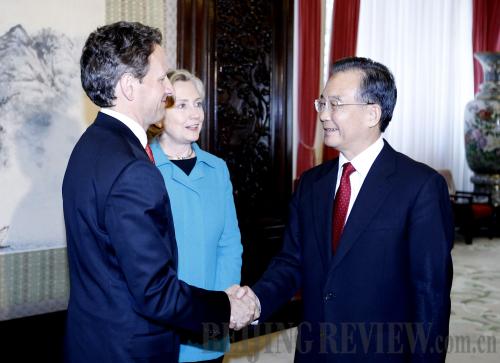|
 |
|
A FIRM HANDSHAKE: Chinese Premier Wen Jiabao meets with the special representatives of U.S. President Barack Obama for the second round of China-U.S. Strategic and Economic Dialogue—Secretary of State Hillary Clinton and Treasury Secretary Timothy F. Geithner—in Beijing on May 25 (DING LIN) |
The second round of the China-U.S. Strategic and Economic Dialogue was held in Beijing on May 24-25. Attracting a great deal of attention, the dialogue produced significant achievements, and also numerous to-the-point remarks by both Chinese and U.S. top officials. Some of these were:
On China-U.S. Relations
This unprecedented undertaking of building a new China-U.S. partnership is ground-breaking and it will not be smooth all the way. Through practice, we can see that this is the only and inevitable way it can be done.
—Dai Bingguo, Chinese State Councilor
There is a Chinese proverb that speaks of treading different paths that lead to the same destination. Our two nations have unique histories. China is home to an ancient civilization. America is a young nation. But we know that our future, both our challenges and our opportunities, will be shared. We have traveled different paths, but that shared future is our common destination and responsibility. And, ultimately, that is what this dialogue is about.
—Hillary Clinton, U.S. Secretary of State
On Trade and Investment
We appreciate the United States' proposals including relaxing export restrictions and welcoming foreign enterprises investing in their country. We also hope to find out the detailed timetable and plans for the United States' gradual elimination of barriers for hi-tech exports to China, equal treatment of Chinese enterprises investing in their country and recognition of China's market economy status.
—Wang Qishan, Chinese Vice Premier
I hope the United States will really cancel all discriminatory export controls to China. If the U.S. Government does so, enterprises from both sides will benefit a lot.
—Chen Deming, Chinese Minister of Commerce
Although it's become something of a sport to portray every trade disagreement between the United States and China as evidence of an impending trade war, it is important to remember that such disagreements cover a very small fraction of the trade between our two countries.
—Gary Locke, U.S. Commerce Secretary
On the Renminbi (yuan)
Although China is a country with an export-oriented economy, it is a big country with a population of 1.3 billion people. Therefore, the domestic factors are key concerns. International factors also have some impact on the country's monetary policy, but the impact is always less significant than that of domestic factors.
—Zhou Xiaochuan, President of the People's Bank of China
We welcome the fact China's leaders have recognized reform of the exchange rate is an important part of their broader reform agenda.
—Timothy F. Geithner, U.S. Treasury Secretary
On Clean Energy
The China-U.S. new energy research and development cooperation mainly focuses on three fields—new-energy vehicles, energy-saving buildings, and clean coal.
—Cao Jianlin, Vice Minister of Science and Technology of China
In many areas, and especially in clean energy, the interests of China and the United States are tied together.
—Gary Locke, U.S. Commerce Secretary
On Innovation
China will not change its policies of upholding indigenous innovation and encouraging foreign enterprises to invest and research in China.
—Cao Jianlin, Vice Minister of Science and Technology of China
On the U.S. Fiscal Deficit
As the economy strengthens, we will bring down our fiscal deficits to sustainable levels. The President has laid out a detailed, comprehensive plan to cut our budget deficit as a share of GDP by more than half over the next few years.
—Timothy F. Geithner, U.S. Treasury Secretary
On Withdrawal of Economic Stimulus Measures
[Both Chinese and U.S.] Ministers still hold we should be very careful with the timing of the withdrawal strategy. If we do carry out this strategy, we must take stable and steady steps.
—Zhang Xiaoqiang, Vice Minister of the National Development and Reform Commission of China | 